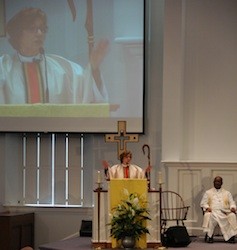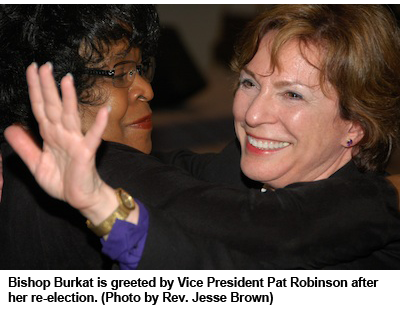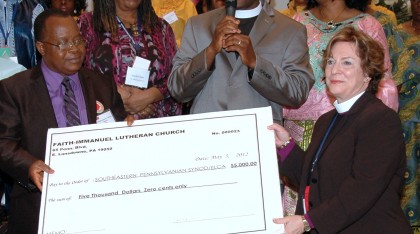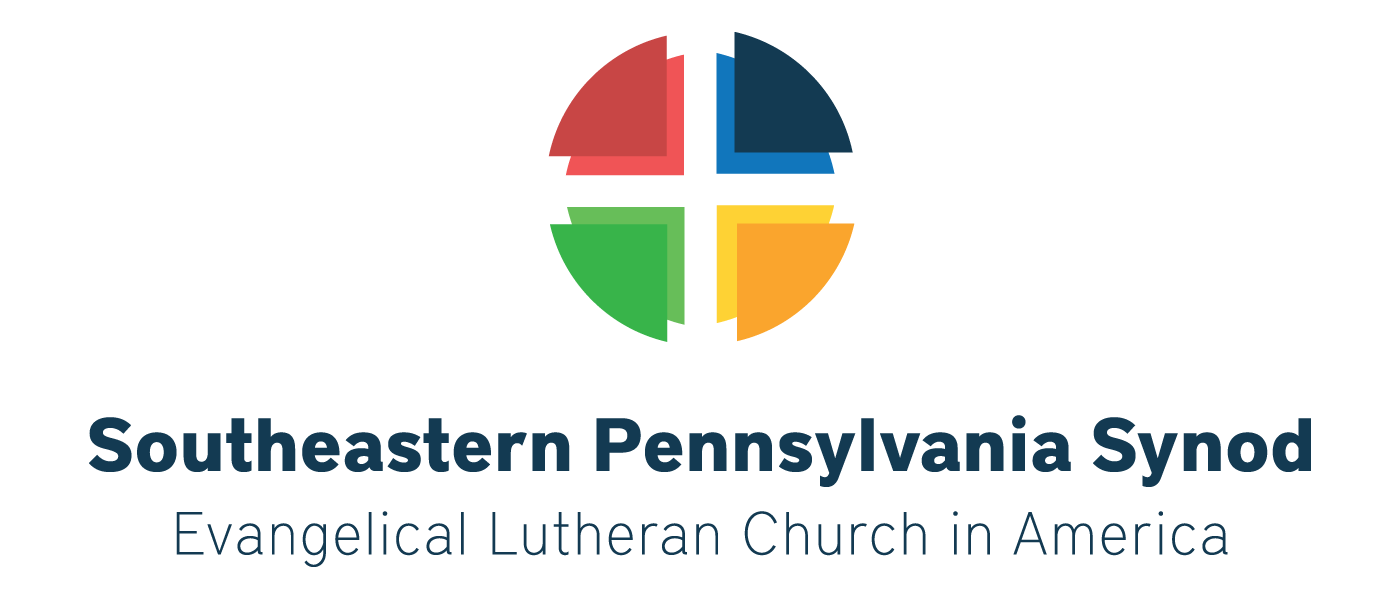2012 Assembly
The 2012 Southeastern Pennsylvania Synod Assembly met May 4-5, 2012 to lift up our common ministries and to elect a bishop for a six-year term. Bishop Claire S. Burkat was re-elected on the first ballot with 75% of the votes cast.
Download the 2012 Assembly report
Assembly Re-elects Bishop Burkat
“I’ve learned over the last six years that the synod elects a pastor and forms a bishop. And you have formed me,” Bishop Claire Burkat told the 2012 Southeastern Pennsylvania Synod Assembly Friday after it re-elected her to a second six-year term as bishop.
“We are embarking on a new world of ways that we can network and reach out to one another, and God will multiply our efforts more than we can imagine,” she said.
Burkat received exactly the 348 votes required to meet the three-fourths requirement of the 464 legal votes cast Friday morning.
The election came on the first, ecclesiastical ballot of the election process. The full Assembly hall erupted in applause when the result was announced. The Assembly then celebrated the election in song.
“I want to thank all of you for your love and prayer and support and forgiveness, and for your truth-telling – even when I did not want to hear it,” Burkat told the Assembly.
“I have been stretched and strengthened in ways I could not have imagined: spiritually, emotionally, vocationally, intellectually,” she said.
‘Be God’s Dandelion Church!’
 At the opening worship of the 2012 Southeastern Pennsylvania Synod Assembly, Bishop Claire Burkat compared the church to a dandelion.
At the opening worship of the 2012 Southeastern Pennsylvania Synod Assembly, Bishop Claire Burkat compared the church to a dandelion.
“Just one bright yellow flower, when it’s done blooming yields hundreds of tiny seeds that parachute through the air and land to take root, starting the process all over again,” said Burkat.
She told the Assembly about seeds of word and service currently being spread throughout the synod.
“We are called to spread the Gospel,” Said Burkat. “Everyone is a potential dandelion seed who believes that the power of God through Jesus Christ springs eternal-anywhere, anytime, anyplace.”
“Live a dandelion faith! Be God’s dandelion church,” she said.
Plant it! Water it! Watch it Grow!
 “This is a new season of health and vitality…for the Kingdom of God, for the ELCA, and right here in the Southeastern Pennsylvania Synod,” Bishop Claire Burkat said in her address to the 2012 Assembly.
“This is a new season of health and vitality…for the Kingdom of God, for the ELCA, and right here in the Southeastern Pennsylvania Synod,” Bishop Claire Burkat said in her address to the 2012 Assembly.
“I see lots of life,” the bishop said, reflecting on her visits to congregations throughout her first term as bishop.
Drawing on the Assembly theme Ecclesia Plantanda, the church must be planted, the bishop described new seeds and thriving plants she has observed across the synod.
“I see many strong, healthy, mature plants, congregations deeply rooted in their communities that provide their neighbors with beauty and shade and food – and the Gospel. Dedicated church leaders who are busy watering and fertilizing the soil of the Kingdom, and pulling out weeds that threaten to choke off our witness to the Gospel,” she said.
“The good news we know and we proclaim is that we are not responsible for the growth – it’s God who gives the growth!” the bishop said. “Our call is to faithfully plant, water and tend the garden, whether it is a season of growth or decline.”
Celebrating Our Heritage, Welcoming the Future
What relevance does the experience of Henry Melchior Muhlenberg planting the church across pre-Revolutionary Southeastern Pennsylvania hold for those of us engaged in ministry here today?
That’s the question the Rev. Dr. Karl Krueger, Director of the Krauth Memorial Library and Professor of History of Christianity at The Lutheran Theological Seminary at Philadelphia, set out to address in two presentations to the 2012 Assembly.
In his presentation, titled “Celebrating Your Heritage, Embracing Ministry, Welcoming the Future,” Krueger offered some of Muhlenberg’s experiences that present-day leaders might relate to. Even before he left for America his salary was downsized while his responsibilities increased. Once he arrived he experienced a “thirty-three mile circuit with no SEPTA, no Turnpike, just horseback for travel from place to place.” He also had to learn English, the official language of the English colony of Pennsylvania.
Muhlenberg was clearly globally connected, as we need to be today. He maintained the connections with Halle and with India, where others had been sent. He also connected with others where he served, pastors and congregation leaders, and recognized they all needed assistance.
Dr. Krueger pointed out the dynamic spirituality that was a part of Muhlenberg’s life. His box of daily prayer cards was a regular reaffirmation of the Word, and a guide as he followed Luther’s formula to “pray, meditate and practice.”
Muhlenberg also rethought theological education. He and his contemporaries were trained in Halle and elsewhere in Europe, but he saw the need to train pastors in the colonies, in context.
Faith-Immanuel is Our Newest Congregation
It’s a long way from Liberia to East Lansdowne, but over that distance God planted the seeds of the church and nurtured a small worshipping community in a refugee camp into a thriving Lutheran Church.
In 1996, a high-school student named Moses Dennis(right), who fled the Liberian civil war for a refugee camp in Ghana, was organizing a Lutheran worshipping community there. The young man gathered prayer groups house to house, said Thomas Kpanka, a fellow refugee. “He was hard-working, and always evangelizing,” Kpanka said.
Immanuel Lutheran Church had been thriving on Penn Boulevard since 1906, but as the dawn of the 21st Century neared, “we had lost a lot of members,” said former church administrator Virginia Leitch. “Some moved, others got older and died. We reached a point where there were not many people coming.”
President Samuel Kolleh presents Bishop Burkat with a “birthday gift” of $5,000 from newly organized Faith-Immanuel Lutheran Church.
By the time Immanuel’s leaders asked the synod for help to prevent the church from closing, Dennis had immigrated to Philadelphia where he studied at the Lutheran Theological Seminary. The synod proposed calling Dennis to serve the dwindling Immanuel and to build a congregation of Africans. Kpanka (right) had also resettled to this area, and a small group began meeting in his home for prayer and fasting. “God was very, very wonderful to us,” he said. “God led us to the ministry.”
“When we started there were seven of us in prayer meetings,” Dennis recalls. Soon there were a couple of dozen at prayer, and 70 people gathered for the initial worship. Today the new Faith-Immanuel Lutheran Church averages 160 people at worship.
In addition to a lively African praise service, Pastor Dennis holds traditional worship for a faithful Immanuel remnant twice a month. In addition to a thriving day care and scout groups, the church is home to the Christian Vision Broadcasting Network, an internet radio station linking Liberian immigrants locally with their homeland with a mix of gospel programming, preaching and social justice activism.
“I want to say thank you to the Synod, thank you to the bishop…and also thank you to the whole ELCA for helping us,” said council president Samuel Kolleh. As a token of that thanks the congregation gave the Synod a birthday gift of $5,000.
A Biblical Mandate for Planting
“As baptized children of God we have a biblical mandate to be church planters,” Rev. Patricia Davenport, SEPA director for evangelical mission, told the Assembly. “Beloved, we have been commissioned to plant churches one person at a time, it is part of our DNA that ought to excite you!”
She reminded the Assembly that Ecclesia Plantanda—the church must be planted, was the motto of Henry Melchior Muhlenberg. The church must be planted in every age, including ours, just as it was in his Muhlenberg’s day.
“Must, means it’s an essential thing,” said Davenport. “It is this sense of necessity, obligatory responsibility as a synod to plant the seeds in hard places. Because this is not only what we do, but who we are because this is who God is!”
The urgent mandate to grow the church directs us to look to the hard places where, like a plant growing in the crack of a sidewalk, the church can grow. She pointed to a ministry like Living Gospel, which grew out of listening to men and women who have been incarcerated. In Pennsylvania, the return rate to prison for those who have been incarcerated is high.
“Living Gospel is hope for men and women looking for a faith foundation, unconditional love and hospitality and a sense of community,” she said.
The Synod has also started its first Korean ministry under the leadership of Pastor Jonathan Shin in conjunction with St. Peter, North Wales.
From Tanzania, via Skype
Reports at the 2012 Assembly of the Southeastern Pennsylvania Synod (SEPA) of the Evangelical Lutheran Church in America (ELCA) became global when Susan and Tom MacPherson appeared on May 5, live from Tanzania via Skype.
Tom thanked the synod for giving them the opportunity to serve in Tanzania and share the SEPA story in its companion synod. He told about the planting they had been doing – planting a farm with peppers, onions, carrots and potatoes. “It was months and hours of hard work, and nothing has yet happened. It takes time for plants to take root,” he explained. And their work is taking root in Tanzania.
‘You are the ELCA’
“The ELCA is the church that shares a living, daring confidence in God’s grace” was the message The Rev. Dr. Sherman Hicks, Director for Ethnic Specific and Multicultural Ministries of the Evangelical Lutheran Church in America (ELCA), brought to the 2012 Assembly of the Southeastern Pennsylvania Synod.
Members of the Synod serve the wider church through the work of synod members on Church Council and on task forces and churchwide committees. He thanked the individuals and congregations whose mission support enabled the Synod to send over $1.2 million to the ELCA and allow its partners, agencies and global partners to fund important work in the world.
Partnership comes back to Southeastern Pennsylvania, where five churches are supported in mission development, over $39,000 has been provided in hunger grants to help in ministry to the hungry and poor, and three SEPA congregations have received ELCA congregational renewal grants.
Surplus 2013 Budget Approved
The Assembly overwhelmingly approved a 2013 budget that calls for ending the year with a surplus of approximately $10,000.
The budget anticipates income of $2.26 million in partnership support from congregations and $1.36 million in additional income, with expenses of $3.61 million. The budget maintains partnership support to the ELCA at 53.5 percent of giving by congregations, and does not require revenue from sales of church properties or transfers from reserves to balance.
Earlier, the Assembly heard that the 91 congregations increased or maintained partnership support in 2011, with 24 congregations sending 10 percent or more of their regular giving by members. In all partnership support revenue decreased by 4 percent in 2011. Due to nearly $260,000 in ongoing savings produced by reducing staff and making targeted expense reductions, the 2012 spending plan expects to complete the year with a small surplus.
Other Actions
Resolutions
Lutheran Association of Christian Educators (LACE) Uplifted by Assembly
The Lutheran Association of Christian Educators (LACE), a network of people whose mission is “connecting and serving those dedicated to Christian faith formation” was recognized and uplifted by the 2012 Assembly of the Southeastern Pennsylvania Synod.
diakonia™ and Lay Theological Education Supported
The 2012 Assembly of the Southeastern Pennsylvania Synod passed a resolution of support for diakonia™ a lay theological education program which prepares Christians to fulfill their baptismal calling and for all lay theological education programs, in general.
The Assembly encouraged congregations to increase awareness of lay educations opportunities including diakonia™ and to encourage participation in them. The resolution also urged congregations to provide financial resources for members’ continuing education in the faith and to find ministry roles for diakonia™ graduates.
Through the resolution the 2012 Synod Assembly itself covenanted to support lay theological education.
Resolution to Strengthen Conferences
The 2012 Assembly directed the Synod’s Constitution Committee to review the process for the election of Deans and bring a report with recommendations to the 2013 Synod Assembly of the Southeastern Pennsylvania Synod.
The resolution also directed the Office of the Bishop, Synod Council, and the committee of Deans to formulate a plan of education for to strengthen the structure of conferences in the synod in order to increase their capacity for mission.
The resolution was originally submitted by members of the Upper Bucks Conference, the self-dubbed Koinonia conference, because they have had such a positive experience of learning and serving together. Koinonia is a Greek word meaning a deep fellowship and communion.
Assembly Encourages Sabbatical Guidelines for Rostered Leaders
A sabbatical is an opportunity for rest, renewal, and spiritual growth. Recognizing the importance of sabbaticals, the Assembly voted to direct the Synod Council to appoint a task force to develop sabbatical guidelines for rostered leaders. The task force will report back to the 2013 Synod Assembly.
Assembly Commits to Support the ELCA Malaria Campaign
The Evangelical Lutheran Church in America has set a goal to raise 15 million dollars to work directly with companion churches in Africa to prevent and treat malaria. The 2012 Assembly of the Southeastern Pennsylvania Synod committed to support this important cause through prayer, advocacy, education, and financial resources. They also directed the Synod Council to appoint a task force to develop a synod strategy to promote and support this campaign.
Elections
Churchwide Assembly:
Elected for Churchwide Assembly, Young Adult, Lay Woman: Courtney Smith
Elected for Churchwide Assembly, Youth – Man: Malcolm Davis
Elected for Churchwide Assembly, Lay Woman: Addie Butler, Jill Meuser, Jane Roper
Elected for Churchwide Assembly, Clergy: Larry Smoose, Cynthia Krommes, Jennifer Ollikainen, Sandra Brown, Gwendolyn King, Michael Carlson
Elected for Churchwide Assembly, Lay Men: Mark Goodwin, Christian Hicks, Thomas Salber, Karl Segletes
Synod Council:
Elected for Synod Council, Clergy : Regina Goodrich, Henrik Sonntag, Harold Evans
Elected for Synod Council, Lower Montgomery Conference Representative: Susan Massey
Elected for Synod Council, At Large Representative, Lay Man: Bob Hensil
Elected for Synod Council, At Large, Lay Woman: Susan Pursch



